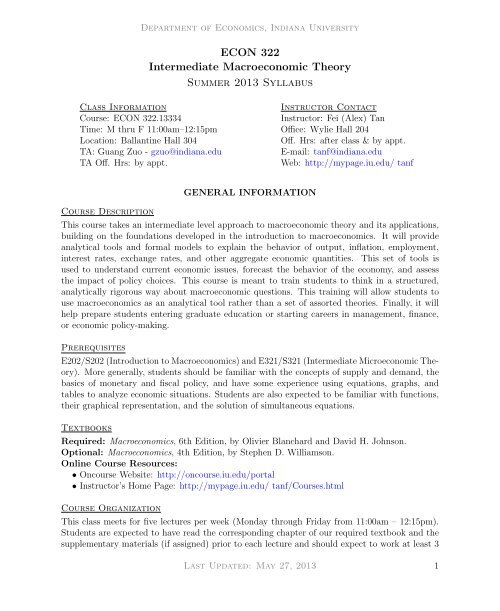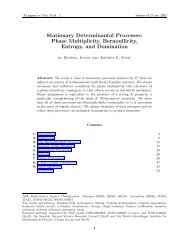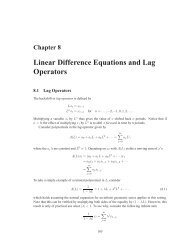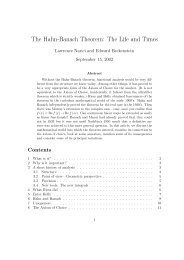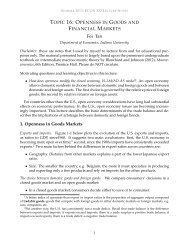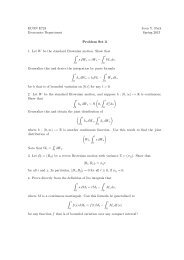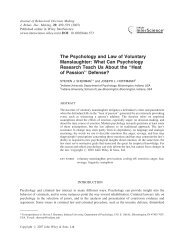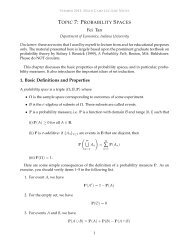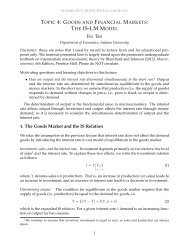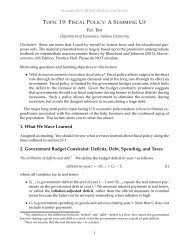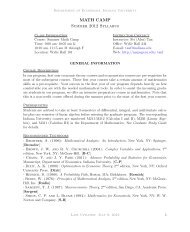Syllabus - Mypage - Indiana University
Syllabus - Mypage - Indiana University
Syllabus - Mypage - Indiana University
You also want an ePaper? Increase the reach of your titles
YUMPU automatically turns print PDFs into web optimized ePapers that Google loves.
Department of Economics, <strong>Indiana</strong> <strong>University</strong><br />
ECON 322<br />
Intermediate Macroeconomic Theory<br />
Summer 2013 <strong>Syllabus</strong><br />
Class Information Instructor Contact<br />
Course: ECON 322.13334 Instructor: Fei (Alex) Tan<br />
Time: M thru F 11:00am–12:15pm Office: Wylie Hall 204<br />
Location: Ballantine Hall 304 Off. Hrs: after class & by appt.<br />
TA: Guang Zuo - gzuo@indiana.edu E-mail: tanf@indiana.edu<br />
TA Off. Hrs: by appt. Web: http://mypage.iu.edu/ tanf<br />
Course Description<br />
GENERAL INFORMATION<br />
This course takes an intermediate level approach to macroeconomic theory and its applications,<br />
building on the foundations developed in the introduction to macroeconomics. It will provide<br />
analytical tools and formal models to explain the behavior of output, inflation, employment,<br />
interest rates, exchange rates, and other aggregate economic quantities. This set of tools is<br />
used to understand current economic issues, forecast the behavior of the economy, and assess<br />
the impact of policy choices. This course is meant to train students to think in a structured,<br />
analytically rigorous way about macroeconomic questions. This training will allow students to<br />
use macroeconomics as an analytical tool rather than a set of assorted theories. Finally, it will<br />
help prepare students entering graduate education or starting careers in management, finance,<br />
or economic policy-making.<br />
Prerequisites<br />
E202/S202 (Introduction to Macroeconomics) and E321/S321 (Intermediate Microeconomic Theory).<br />
More generally, students should be familiar with the concepts of supply and demand, the<br />
basics of monetary and fiscal policy, and have some experience using equations, graphs, and<br />
tables to analyze economic situations. Students are also expected to be familiar with functions,<br />
their graphical representation, and the solution of simultaneous equations.<br />
Textbooks<br />
Required: Macroeconomics, 6th Edition, by Olivier Blanchard and David H. Johnson.<br />
Optional: Macroeconomics, 4th Edition, by Stephen D. Williamson.<br />
Online Course Resources:<br />
• Oncourse Website: http://oncourse.iu.edu/portal<br />
• Instructor’s Home Page: http://mypage.iu.edu/ tanf/Courses.html<br />
Course Organization<br />
This class meets for five lectures per week (Monday through Friday from 11:00am – 12:15pm).<br />
Students are expected to have read the corresponding chapter of our required textbook and the<br />
supplementary materials (if assigned) prior to each lecture and should expect to work at least 3<br />
Last Updated: May 27, 2013 1
Department of Economics, <strong>Indiana</strong> <strong>University</strong><br />
hours per day outside of class. Class activities are based on the premise that you have read the<br />
textbook and the materials assigned, at least once, prior to each class. Lectures only compliment<br />
the required reading materials. Lectures are not a substitute for the readings nor are the readings<br />
a substitute for attending and participating in class. After each class the lecture slide of that<br />
class will be posted as online resources on both course websites and you should reconstruct your<br />
notes based upon these materials so that you truly understand the material. You are responsible<br />
for all materials presented in the textbook, lecture, and supplementary materials, as preparation<br />
for an exam.<br />
Course Expectations<br />
Expectations on Classroom Decorum are based on the Code of Student Rights, Responsibilities<br />
and Conduct. Common courtesy and standards of professional conduct require that you arrive<br />
promptly for class, remain attentive for the entire class period, and refrain from any disruptive<br />
behavior. As a community of scholars, we are all dedicated to the pursuit of knowledge, truth,<br />
and excellence. Disturbances that interfere with learning and/or instruction will not be tolerated.<br />
Behaviors that are distracting–arriving late for class, chatting during class, leaving class early,<br />
reading a newspaper, ringing of phones, nonacademic use of laptops, even sleeping–are destructive<br />
to the teaching/learning process and therefore should not occur. Disorderly conduct has no place<br />
in an IU classroom and will be dealt with as personal misconduct according to the Code.<br />
Examinations<br />
IN- & OUT-OF-CLASS ACTIVITIES<br />
The examinations will be either multiple choice, or graphical/numerical problems, or short essay<br />
questions, or any combination of these three. There will be two in-class exams each worth 40%<br />
or 200 points of the course grade. The two exams are scheduled on the following days:<br />
MID-TERM Thursday, May 23 10:30am – 12:30pm<br />
FINAL EXAM Friday, June 14 10:30am – 12:30pm<br />
Attendance Reward<br />
Attendance is not mandatory but strongly recommended. Five unannounced attendance will<br />
be taken throughout the semester and your properly documented attendance will be rewarded<br />
with a maximum of twenty extra-credit points. Each recorded attendance will count as four<br />
points. There will be no extra-credit points given for attendance if you are not in class for any<br />
reason.<br />
Homework<br />
There will be four required homework assignments, each of which is worth 25 points. Late<br />
homework is not graded and will be nullified. Handing in homework in other sections other than<br />
your registered section is not graded and will be nullified. Homework assignments are worth 20%<br />
or 100 points of the course grade.<br />
Last Updated: May 27, 2013 2
Make-Up Policy<br />
Department of Economics, <strong>Indiana</strong> <strong>University</strong><br />
GRADING POLICY<br />
There are no make-up exams. The points from the excused, missed exam will be placed onto the<br />
final exam. No make-ups are provided for homework. The missed homework points, due to an<br />
approved absence, will be considered when calculating your final grade.<br />
Grading Scale<br />
The final grade for the course is based upon the percentage of the number of adjusted total points<br />
earned. There is no grading curve used other than the scale below. Everyone can get an A+ and<br />
everyone can get an F. Please periodically check your grade throughout the semester<br />
for accuracy.<br />
Max Points % of Total Grade Points Percentage<br />
Homework 100 20 A+ 500-485 100-97<br />
Mid-term 200 40 A 484-460 96-92<br />
Final 200 40 A- 459-440 91-88<br />
Total 500 100% B+ 439-425 87-85<br />
B 424-405 84-81<br />
B- 404-385 80-77<br />
C+ 384-370 76-74<br />
C 369-350 73-70<br />
C- 349-335 69-67<br />
D+ 334-320 66-64<br />
D 319-300 63-60<br />
D- 299-275 59-55<br />
F 274-0 54 or less<br />
IMPORTANT MISCELLANEOUS<br />
Please read the following information thoroughly and carefully. I would assume that you have<br />
fully understood these rules during the entire semester.<br />
1. Your schedule must permit you to be free to take the final exam on Friday, June 14,<br />
2013, from 11am to 1pm. There are no alternatives to taking the exam at this time<br />
and date. If you are also enrolled in Economics E321 or any other courses you have a time<br />
conflict, please drop all but one of these conflicting courses now unless you can resolve the<br />
conflict with your instructor(s) in the other course(s). Please do not ask if you may have<br />
an alternative time for the Economics E322 final – you will not be granted this request.<br />
Consult the final exam schedule to avoid additional conflicts.<br />
Last Updated: May 27, 2013 3
Department of Economics, <strong>Indiana</strong> <strong>University</strong><br />
<strong>University</strong> calendar: you can find information about the university calendar (including<br />
holidays and last day for withdrawal) on the following webpage<br />
http://enrollmentbulletin.indiana.edu/pages/offcal.php?Term=3&s=f6w<br />
2. <strong>Indiana</strong> <strong>University</strong> encourages qualified persons with disabilities to participate in its programs<br />
and activities and is committed to the policy that all people shall have equal access<br />
to programs, facilities, and admissions without regard to personal characteristics not related<br />
to ability, performance, or qualifications as determined by <strong>University</strong> policy, by state<br />
or federal authorities. If you desire classroom/testing accommodations for a disability,<br />
contact your instructor outside of class to present the written supporting memorandum of<br />
accommodation from the Office of Disability Services for Students<br />
(http://studentaffairs.iub.edu/dss/). Requests for accommodations for disability must be<br />
received and authorized by your instructor in written form no less than two weeks in advance<br />
of need, in order to allow adequate time to review and make appropriate arrangements. No<br />
accommodation should be assumed until authorized by your instructor.<br />
3. Academic Integrity: dishonesty of any kind is not tolerated in this course. Dishonesty<br />
includes, but is not limited to, cheating, plagiarizing, fabricating information or citations,<br />
facilitating acts of academic dishonesty by others, having unauthorized possession<br />
of examinations, submitting work of another person or work previously used without<br />
informing the instructor, or tampering with academic work of other students. Students<br />
who are found dishonest will receive the most severe academic sanction consistent<br />
with IU polices. A minimum penalty for any breach of academic integrity is the<br />
grade of “F” for the course. The <strong>University</strong> of <strong>Indiana</strong> has information at its website:<br />
http://www.iu.edu/ code/code/responsibilities/personal/index.shtml. Be sure to read the<br />
contents of this site.<br />
4. The last day to withdraw from the class and receive an automatic “W” is Tuesday, May<br />
28th, 2013, by 4:00pm. This is also the last day to get a withdrawal slip signed without<br />
a special petition. After this date, you can obtain a late withdrawal from a course only by<br />
first receiving special permission from the dean of the college. Such permission is VERY<br />
difficult to get. <strong>University</strong> rules specify that permission for late withdrawals is “given only<br />
for urgent reasons relating to extended illness or equivalent distress” to a student who is<br />
“passing the course on the date of withdrawal.”<br />
5. You are required to pay attention during the entire class time. In general, it is unacceptable<br />
to be late for class, leave early, fall asleep or talk during class. These are disruptions to<br />
the learning environment. If very special circumstances arise and you must be late, then<br />
enter quickly and quietly. Sit in the last few rows. If very special circumstance arise and<br />
you must leave early, sit in the one of last few rows, near a door and stealthily leave so it<br />
is not noticeable.<br />
6. Valid Excuses: during the course many possible events may occur that would result in<br />
your inability to attend class, exams, or perform at a minimally acceptable level during an<br />
examination. The followings can be legitimate reasons to miss class or to be excused from<br />
a scheduled examination.<br />
Last Updated: May 27, 2013 4
Department of Economics, <strong>Indiana</strong> <strong>University</strong><br />
(a) Illness or injury: a note from a physician, physician’s assistant, or a nurse-practitioner<br />
that says, among other things, “..unable to attend..” is required. The words “unable to<br />
attend” must be precisely stated in the note. If the note leaves any ambiguity on this point<br />
you will not be excused. Further, the note must be provided to the instructor within one<br />
week of the missed course event (in cases of extended illness or incapacity, the note must<br />
be provided within a week of the end of your illness or incapacity, and it should specify the<br />
period of your inability to attend the course).<br />
(b) Family emergencies: you must provide verifiable documentation of the emergency.<br />
Given the vast array of family emergencies the instructor will provide precise guidance as<br />
to what constitutes adequate documentation. Unless the emergency is critical you should<br />
notify the instructor in advance of your absence from the scheduled course event. In cases<br />
of critical emergencies, you must notify the instructor within one week of your absence.<br />
(c) <strong>University</strong>-approved curricular and extra-curricular activities: verifiable documentation<br />
is also required. The student should obtain from the unit or department sponsoring the<br />
activity a letter (or class absence form) indicating the anticipated absence(s). The letter<br />
must be presented to the instructor at least one week prior to the first absence.<br />
(d) Religious holidays: the student should notify the instructor by the third week of the<br />
course of any potential conflicts.<br />
Please note that some modification of policies may be required during the semester. The instructor<br />
will make explicit announcements pertaining to any such changes.<br />
ONE FINAL COMMENT<br />
I recommend the following strategy to get the best grade you can in this class. First, read the<br />
textbook and supplementary materials thoroughly in a timely manner. Come to class regularly,<br />
prepared with questions, and stay engaged in the lecture and all class activities. Missing a<br />
single class will put you significantly behind. Second, you need to remember that economics<br />
is conceptual ideas communicated in mathematical frameworks, which means that you need<br />
to practice drawing graphs and solving problems. Third, because thinking like an economist<br />
involves using the language of economics precisely, you should spend time learning the vocabulary<br />
of the course.<br />
TENTATIVE COURSE OUTLINE<br />
Below is a tentative outline. My goal is to proceed at an optimal pace: slow enough that<br />
important concepts are thoroughly learned, yet fast enough that the course does not drag. It is a<br />
delicate balance. Consequently, this outline is subject to change. Any changes will be announced<br />
in class.<br />
Last Updated: May 27, 2013 5
Department of Economics, <strong>Indiana</strong> <strong>University</strong><br />
Appendix: TENTATIVE ECON 322.13334 SCHEDULE<br />
Week ♯ 1 May 7 Topic 1: “A Tour of the Book”<br />
May 8 Topic 2: “The Goods Market”<br />
May 9 Topic 3: “Financial Markets”<br />
May 10 Topic 4: “Goods and Financial Markets: The IS-LM Model”<br />
Week ♯ 2 May 13 Review ♯ 1<br />
May 14 Topic 5: “The Labor Market”<br />
May 15 Topic 6: “Putting All Markets Together: The AS-AD Model”<br />
May 16 Topic 7: “Phillips Curve, Natural Rate of Unemp., and Inflation”<br />
May 17 Topic 8: “The Facts of Growth”<br />
Week ♯ 3 May 20 Review ♯ 2<br />
May 21 Topic 9: “Saving, Capital Accumulation, and Output”<br />
May 22 Topic 10: “Technological Progress and Growth”<br />
May 23 Midterm Exam: 10:30am – 12:30pm<br />
May 24 Topic 11: “Tech. Progress: The Short, Medium, and Long Run”<br />
Week ♯ 4 May 27 Memorial Day–No class<br />
May 28 Review ♯ 3<br />
May 29 Topic 12: “Expectations: The Basic Tools”<br />
May 30 Topic 13: “Financial Markets and Expectations”<br />
May 31 Topic 14: “Expectations, Consumption, and Investment”<br />
Week ♯ 5 June 3 Review ♯ 4<br />
June 4 Topic 15: “Expectations, Output, and Policy”<br />
June 5 Topic 16: “Openness in Goods and Financial Markets”<br />
June 6 Topic 17: “The Goods Market in an Open Economy”<br />
June 7 Review ♯ 5<br />
Week ♯ 6 June 10 Topic 18: “Output, the Interest Rate, and the Exchange Rate”<br />
June 11 Topic 19: “Fiscal Policy: A Summing Up”<br />
June 12 Topic 20: “Monetary Policy: A Summing Up”<br />
June 13 Review ♯ 6<br />
June 14 Final Exam: 10:30am – 12:30pm<br />
Last Updated: May 27, 2013 6


